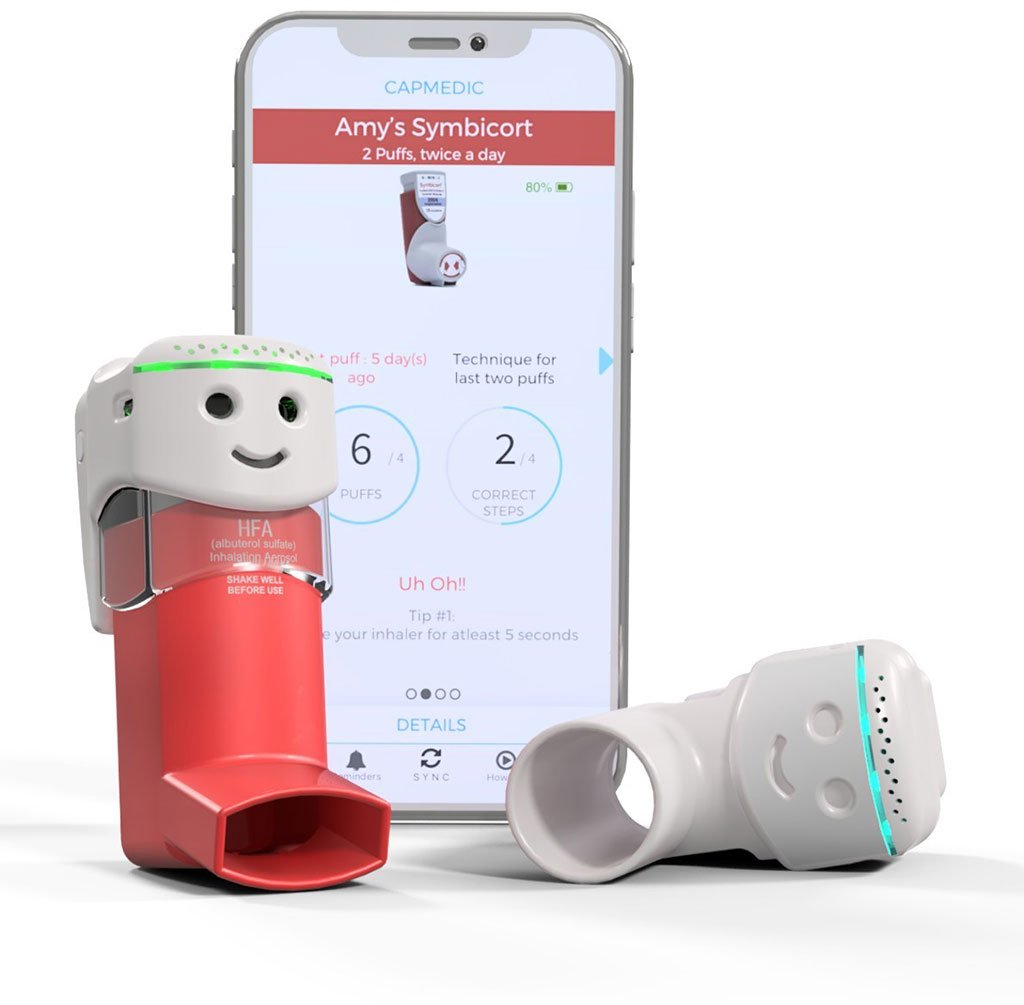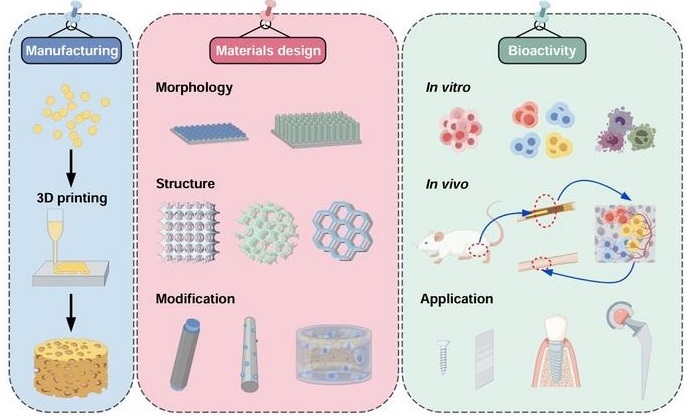Interactive Digital Inhaler Guides Pulmonary Care
|
By HospiMedica International staff writers Posted on 05 Feb 2020 |

Image: The CapMedic inhaler cap and smartphone app (Photo courtesy of Cognita Labs)
The fusion of digital technology and a traditional metered dose inhaler (MDI) provides users with interactive cues that optimize respiratory therapy.
The Cognita Labs (Santa Ana, CA, USA) CapMedic device is a wireless AI-powered sensor cap that can be attached to any MDI, in order to provide precisely timed, step-by-step interactive cues that break down complex inhalation steps. Examples of such audiovisual cues include the correct coordination of deep inhalation, and even easy-to-forget preliminary steps such as shaking the MDI before use and maintaining it in an upright position. Indications for use include asthma, chronic obstructive pulmonary disease (COPD), and other pulmonary conditions.
CapMedic is also a dual-purpose device, thanks to an in-built spirometer that empowers users to track the progression of their lung health by measuring lung parameters such as forced expiratory volume in one second (FEV1) and peak expiratory flow (PEF). Medication and lung function data can be transferred to the CapMedic smartphone app, empowering patients to actively engage in managing their condition and enabling remote patient monitoring (RPM) for providers.
“Decades of studies have shown that almost 90% of patients are unable to use MDIs correctly, a result of their complex, multi-step usage requirements. The Cognita team has conducted drug deposition studies showing a tenfold improvement in the delivery of medication,” said Rajoshi Biswas, PhD, chief scientific officer and co-founder of Cognita Labs. “Our goal with CapMedic is to make inhalers fun and easy to use, while allowing patients to build good inhaler use habits and better manage their respiratory conditions. An effective daily dose means patients are more likely to avoid costly, life-threatening hospitalizations.”
“We've never really known if our patients are getting the medication they need at home because many of them struggle to use inhalers correctly. CapMedic brings us the data we didn't have before,” said pediatric pulmonologist Chris Landon, MD, of the Pediatric Diagnostic Center (Ventura, CA, USA). “We have seen our little patients, and our big ones, loving the sounds and lights of CapMedic while improving their technique. Parents synchronize lung function and medication data with their smartphone app, which gives us a snapshot of their compliance remotely.”
Spirometry is the most common pulmonary function test that measures lung function, specifically the volume and/or flow of air that can be inhaled and exhaled.
Related Links:
Cognita Labs
The Cognita Labs (Santa Ana, CA, USA) CapMedic device is a wireless AI-powered sensor cap that can be attached to any MDI, in order to provide precisely timed, step-by-step interactive cues that break down complex inhalation steps. Examples of such audiovisual cues include the correct coordination of deep inhalation, and even easy-to-forget preliminary steps such as shaking the MDI before use and maintaining it in an upright position. Indications for use include asthma, chronic obstructive pulmonary disease (COPD), and other pulmonary conditions.
CapMedic is also a dual-purpose device, thanks to an in-built spirometer that empowers users to track the progression of their lung health by measuring lung parameters such as forced expiratory volume in one second (FEV1) and peak expiratory flow (PEF). Medication and lung function data can be transferred to the CapMedic smartphone app, empowering patients to actively engage in managing their condition and enabling remote patient monitoring (RPM) for providers.
“Decades of studies have shown that almost 90% of patients are unable to use MDIs correctly, a result of their complex, multi-step usage requirements. The Cognita team has conducted drug deposition studies showing a tenfold improvement in the delivery of medication,” said Rajoshi Biswas, PhD, chief scientific officer and co-founder of Cognita Labs. “Our goal with CapMedic is to make inhalers fun and easy to use, while allowing patients to build good inhaler use habits and better manage their respiratory conditions. An effective daily dose means patients are more likely to avoid costly, life-threatening hospitalizations.”
“We've never really known if our patients are getting the medication they need at home because many of them struggle to use inhalers correctly. CapMedic brings us the data we didn't have before,” said pediatric pulmonologist Chris Landon, MD, of the Pediatric Diagnostic Center (Ventura, CA, USA). “We have seen our little patients, and our big ones, loving the sounds and lights of CapMedic while improving their technique. Parents synchronize lung function and medication data with their smartphone app, which gives us a snapshot of their compliance remotely.”
Spirometry is the most common pulmonary function test that measures lung function, specifically the volume and/or flow of air that can be inhaled and exhaled.
Related Links:
Cognita Labs
Latest Critical Care News
- ‘Radar Stethoscope’ Paves Way for Contactless Medical Monitoring
- Database Analysis Helps Identify “Sweet Spot” for Safe Surgery after Heart Attack
- First-In-Kind Flowable Collagen Liquid Fills Tissue Defects and Voids
- Wearable Sensor Patch Paired to Smartphone Detects Arrhythmia

- Early Surgery Aids Elderly Heart Patients with Aortic Stenosis, Finds Study
- AI Provides Same-Day Prediction of Bloodstream Infection and Antimicrobial Resistance in ICU Patients
- Cutting-Edge Bioelectronic Device Offers Drug-Free Approach to Managing Bacterial Infections
- Early TAVR Benefits Patients with Asymptomatic Severe Aortic Stenosis
- Sophisticated Machine-Learning Approach Uses Patient EHRs to Predict Pneumonia Outcomes
- First-Of-Its-Kind Experimental Therapy Enhances Tissue Repair After Heart Attack
- AI Model Predicts Patients at Most Risk of Complication During Treatment for Advanced Kidney Failure
- AI Model Predicts Patients’ Risk of Developing and Worsening Disease from ECGs
- Grain-Sized Soft Robots Controlled by Magnetic Fields Deliver Medical Drugs

- AI Tool Helps Identify Heart Failure Risk in Diabetes Patients
- Inflammation Reducing Antibody Could Serve as Cardio-Immunotherapy for Heart Failure Patients
- AI Tool Accurately Identifies Patients Who Could Require Emergency Hospital Admission
Channels
Surgical Techniques
view channel.jpg)
Traditional Open Surgery for Lymph Node Removal Remains Gold Standard for Testicular Cancer
Testicular cancer is significantly less common than breast or prostate cancer but remains the most prevalent solid tumor in males aged 15 to 35. For the right patients, the cure rates for this type of... Read more
3D-Printed Porous Tantalum an Emerging Material for New Generation of Orthopedic Implants
Bones are the hard organs that form the endoskeleton of vertebrates, featuring a complex inner and outer structure that allows them to maintain hardness while minimizing weight. Their roles include facilitating... Read more
Flexible and Reusable Medical-Grade Plastic Device Aids Robot-Assisted Heart Surgery
Robot-assisted heart surgery generally requires the presence of an assistant at the operating table to aid the surgeon in inserting the robotic arm through a small incision. This assistant must continuously... Read morePatient Care
view channel
Portable Biosensor Platform to Reduce Hospital-Acquired Infections
Approximately 4 million patients in the European Union acquire healthcare-associated infections (HAIs) or nosocomial infections each year, with around 37,000 deaths directly resulting from these infections,... Read moreFirst-Of-Its-Kind Portable Germicidal Light Technology Disinfects High-Touch Clinical Surfaces in Seconds
Reducing healthcare-acquired infections (HAIs) remains a pressing issue within global healthcare systems. In the United States alone, 1.7 million patients contract HAIs annually, leading to approximately... Read more
Surgical Capacity Optimization Solution Helps Hospitals Boost OR Utilization
An innovative solution has the capability to transform surgical capacity utilization by targeting the root cause of surgical block time inefficiencies. Fujitsu Limited’s (Tokyo, Japan) Surgical Capacity... Read more
Game-Changing Innovation in Surgical Instrument Sterilization Significantly Improves OR Throughput
A groundbreaking innovation enables hospitals to significantly improve instrument processing time and throughput in operating rooms (ORs) and sterile processing departments. Turbett Surgical, Inc.... Read moreHealth IT
view channel
Machine Learning Model Improves Mortality Risk Prediction for Cardiac Surgery Patients
Machine learning algorithms have been deployed to create predictive models in various medical fields, with some demonstrating improved outcomes compared to their standard-of-care counterparts.... Read more
Strategic Collaboration to Develop and Integrate Generative AI into Healthcare
Top industry experts have underscored the immediate requirement for healthcare systems and hospitals to respond to severe cost and margin pressures. Close to half of U.S. hospitals ended 2022 in the red... Read more
AI-Enabled Operating Rooms Solution Helps Hospitals Maximize Utilization and Unlock Capacity
For healthcare organizations, optimizing operating room (OR) utilization during prime time hours is a complex challenge. Surgeons and clinics face difficulties in finding available slots for booking cases,... Read more
AI Predicts Pancreatic Cancer Three Years before Diagnosis from Patients’ Medical Records
Screening for common cancers like breast, cervix, and prostate cancer relies on relatively simple and highly effective techniques, such as mammograms, Pap smears, and blood tests. These methods have revolutionized... Read morePoint of Care
view channel
Handheld, Sound-Based Diagnostic System Delivers Bedside Blood Test Results in An Hour
Patients who go to a doctor for a blood test often have to contend with a needle and syringe, followed by a long wait—sometimes hours or even days—for lab results. Scientists have been working hard to... Read more
Smartphone-Enabled, Paper-Based Quantitative Diagnostic Platform Transforms POC Testing
Point-of-care diagnostics are crucial for public health, offering rapid, on-site testing that enables prompt diagnosis and treatment. This is especially valuable in remote or underserved regions where... Read moreBusiness
view channel
MEDICA 2024 to Highlight Hot Topics of MedTech Industry
Once again this year, everything at MEDICA (Düsseldorf, Germany) will revolve around the major trends and challenges in medical technology. The focus will be on four key topics that will have a lasting... Read more
Start-Ups To Once Again Play Starring Role at MEDICA 2024
The finalists in the 16th Healthcare Innovation World Cup and the 13th MEDICA START-UP COMPETITION have advanced from around 550 candidates based in 62 countries from Armenia to China and America to Rwanda.... Read more
Boston Scientific to Acquire AFib Ablation Company Cortex
Boston Scientific Corporation (Marlborough, MA, USA) has entered into a definitive agreement to acquire Cortex, Inc. (Santa Clara, CA, USA), the developer of a diagnostic mapping solution designed to identify... Read more












.jpg)

